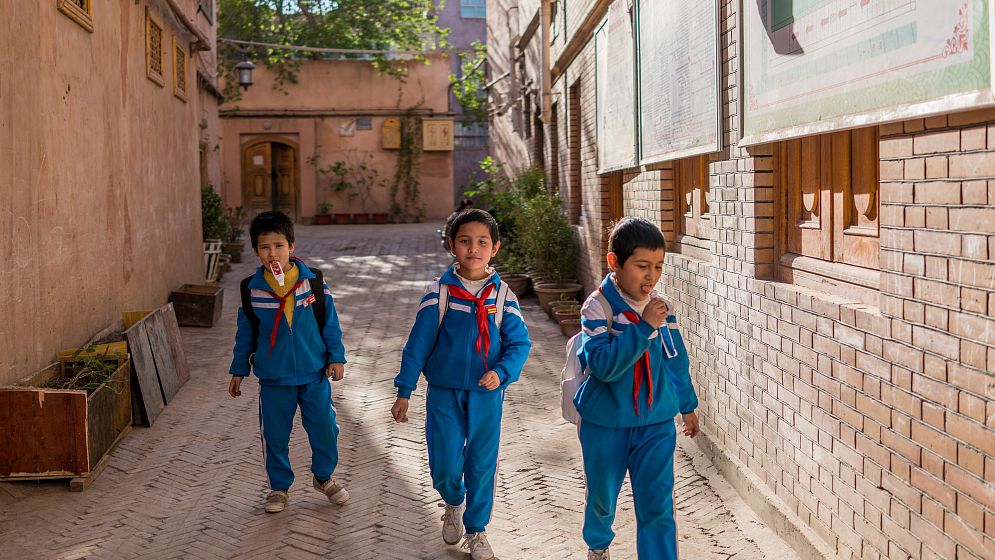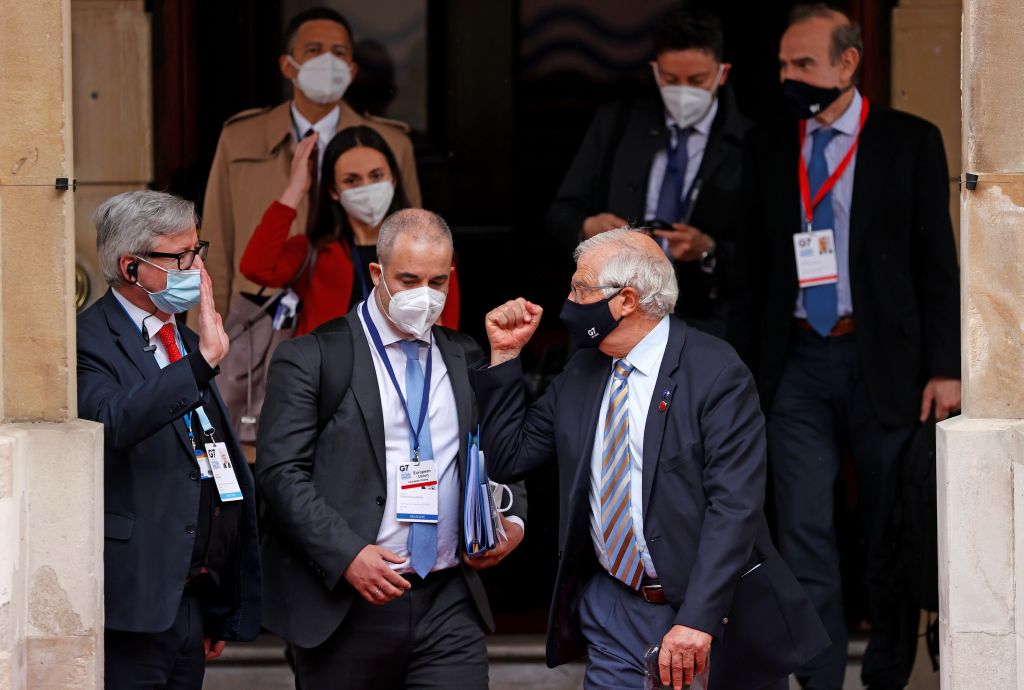
Students walk on a road in Kashgar, northwest China's Xinjiang Uygur Autonomous Region, April 8, 2019. /CFP
Students walk on a road in Kashgar, northwest China's Xinjiang Uygur Autonomous Region, April 8, 2019. /CFP
Editor's note: Cui Xiaotao is an assistant research fellow at the Department for International and Strategic Studies at the China Institute of International Studies. The article reflects the author's opinions and not necessarily the views of CGTN.
Unsurprisingly, at the just-concluded G7 foreign ministers' meeting, human rights in China's Xinjiang Uygur Autonomous Region was presented as one of the main topics. The communiqué after the meeting expressed deep concerns about so-called human rights violations and abuses in Xinjiang. This certainly resulted from the Joe Biden administration's instigation behind the scenes.
Since taking office, the administration has constantly tried to wield "human rights violations" to crack down on China and incite collective critics of China along with a few allies through joint statements and other means.
Does the administration really care about the human rights situation in China so much that it seizes every possible occasion to express its so-called concerns and condemnation instead of focusing on systemic human rights violations at home? Obviously, this is not the case. There is much hegemonic and geopolitical calculation behind the administration's ceaseless smearing.
First of all, it is to maintain the monopoly on the human rights discourse. Looking back in history, it is easy to conclude that American human rights diplomacy has always followed the path of discourse hegemonism. The Biden administration has continued this hegemonic practice.
It regards American definitions and standards of human rights as the only and universal truth, ignoring each country's different historical, socio-economic and political conditions, and denying the diversity of human rights practice internationally. Based on this hegemonic mindset, the administration continues to claim the moral high ground of human rights, blatantly criticizing and arbitrarily suppressing other countries' human rights policies and practices.
Secondly, to use human rights as a political tool for inciting domestic popular sentiment and mobilizing Western allies abroad. Genocide, forced labor, concentration camps, and mass detention have become familiar words frequently misused by the Biden administration to discredit the human rights situation in Xinjiang.
These inflammatory and misleading words can easily arouse the sympathy and anger of ordinary Americans who don't know the facts, contributing to the creation of an anti-China atmosphere to promote the Biden administration's China policy.
At the same time, the administration has repeatedly emphasized Western democratic values shared by America's allies, attempting to use the so-called human rights conditions in Xinjiang to mobilize those countries to form an anti-China circle in the international arena.

European High Representative of the Union for Foreign Affairs Josep Borrell (bottom R) leaves the G7 foreign ministers' meeting in London, UK, May 5, 2021. /Getty
European High Representative of the Union for Foreign Affairs Josep Borrell (bottom R) leaves the G7 foreign ministers' meeting in London, UK, May 5, 2021. /Getty
Last but not least, Washington is attempting to frame China for human rights issues to implement its geopolitical containment strategy. For the Biden administration, human rights in Xinjiang, which involves ethnic minorities and religious topics, is politically exploitable. Xinjiang is also located in a critical position for China's Belt and Road Initiative to run through Eurasia.
Sparing no effort to make trouble by disseminating lies about human rights there can achieve multiple geopolitical purposes such as smearing China's international image, disrupting the stability of China's western borders and inhibiting the implementation of the Belt and Road Initiative.
Thus, the Biden administration's relentless attacks on China with human rights is to serve its geopolitical and hegemonic purposes to contain and suppress the latter. This kind of rogue behavior cloaked in so-called moral responsibility cannot discredit China's human rights achievements after all.
In China's view, there is no fixed standard regarding the practice of human rights. It is necessary to explore suitable human rights development paths based on each country's economic, social, and cultural conditions.
China believes that living a happy life is the primary human right. A happy life includes being free from violent attacks such as terrorism and continuous improvement of living standards.
Facts have shown that China's approaches in Xinjiang are effective in eliminating extremism and helping people obtain professional skills to improve incomes and living standards. These efforts have also helped people affected by extreme thoughts reintegrate into society. Contrary to U.S. accusations, China's Xinjiang policy is a successful practice in protecting and developing human rights, which has improved the happiness of local people's lives.
A lie, even if repeated a thousand times, will not become the truth. China will continue to advance along its human rights development path and use concrete human rights achievements to defeat those ill-intentioned accusations and malicious slanders.
(If you want to contribute and have specific expertise, please contact us at opinions@cgtn.com.)

